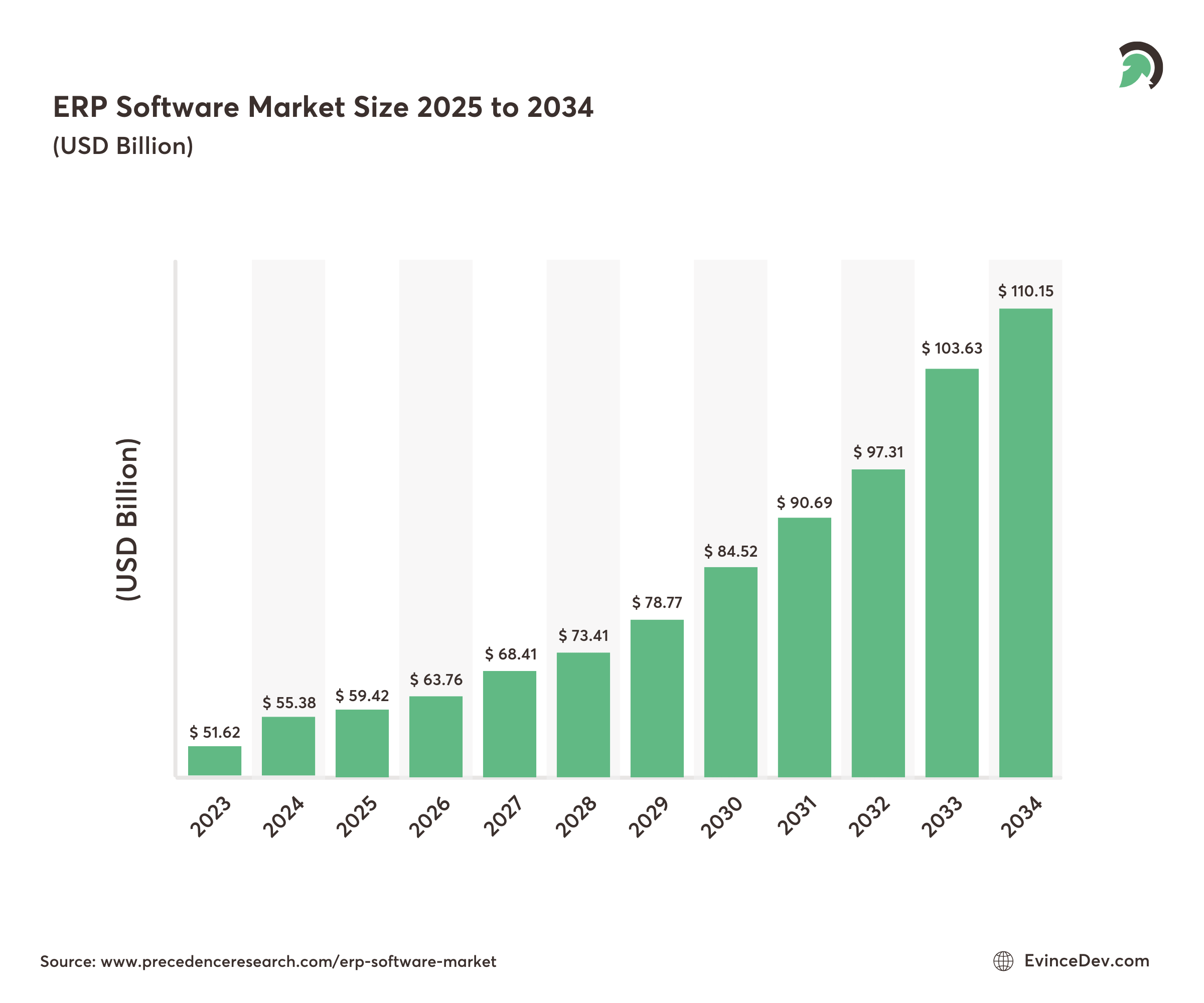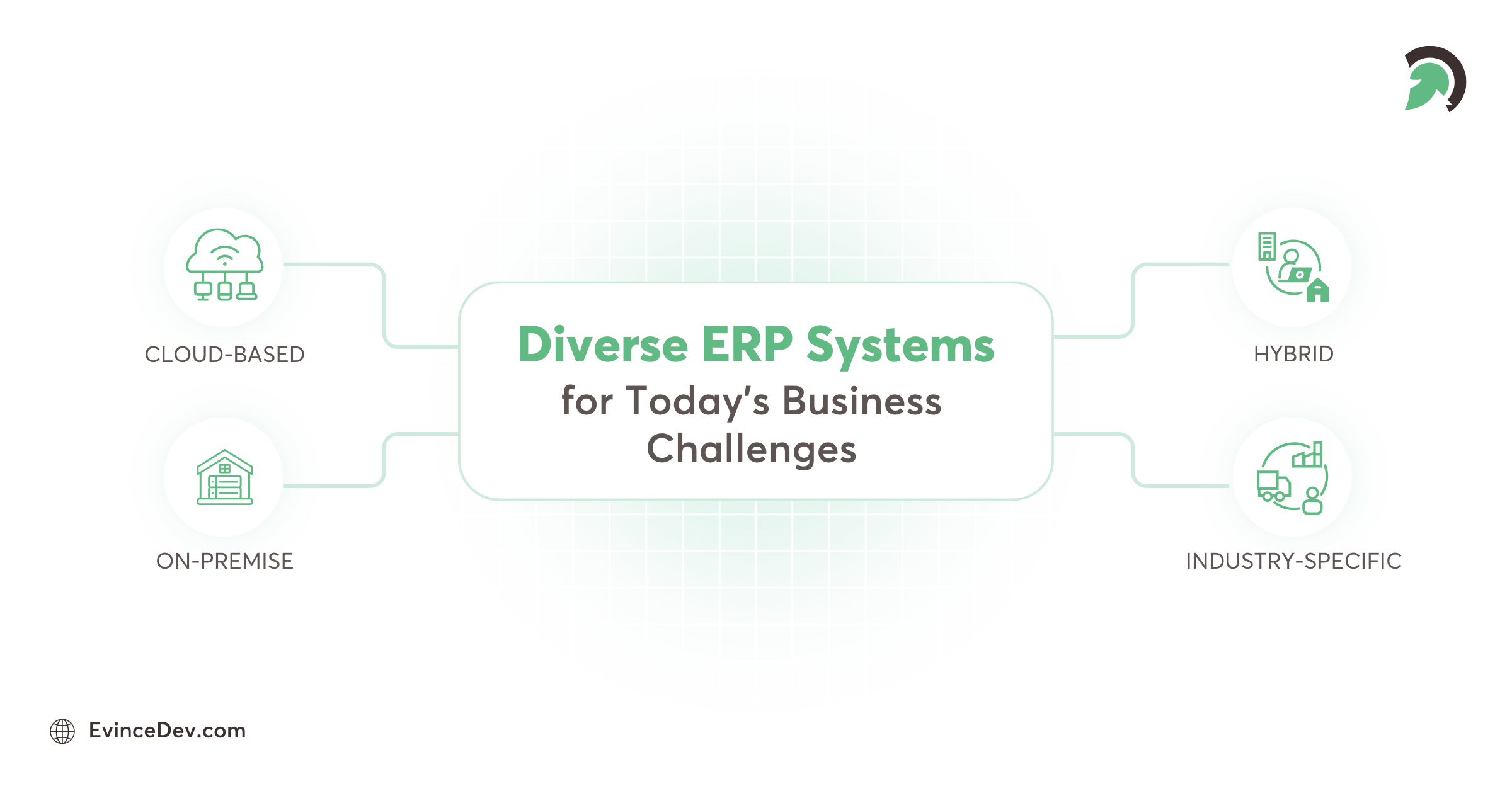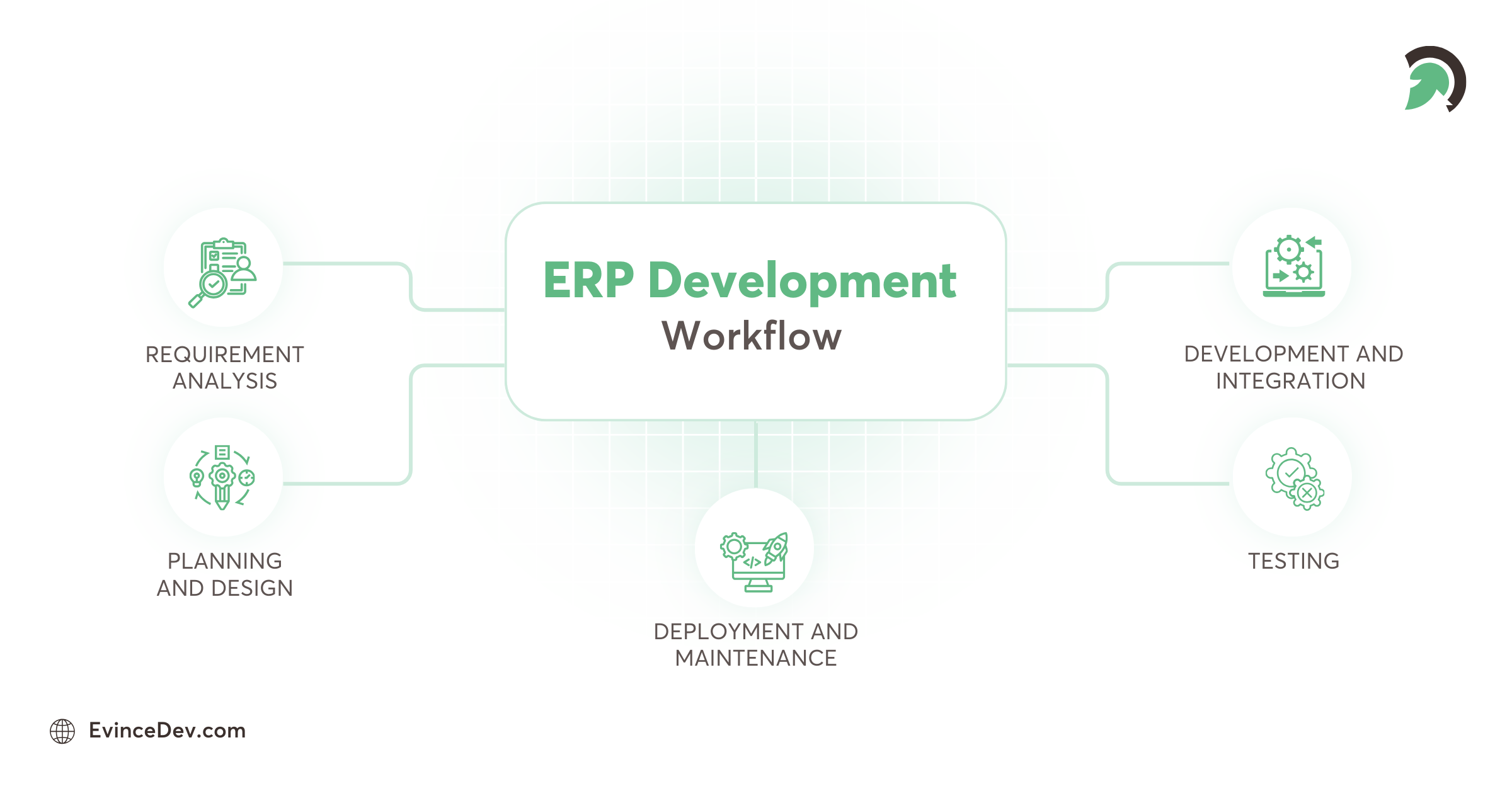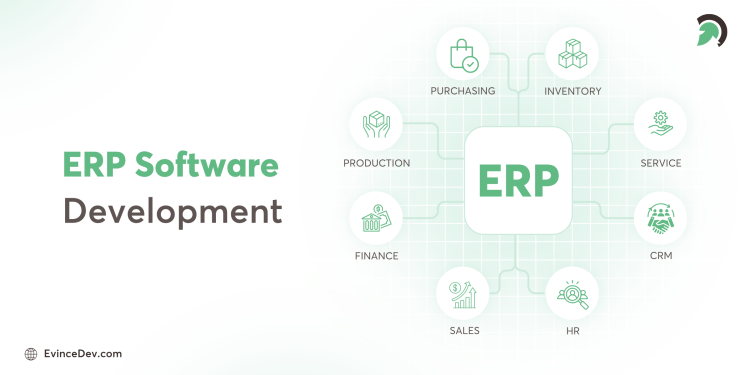Key Takeaways:
- Unified Control: ERP brings finance, HR, procurement, inventory, and operations into one system for tighter control and smoother execution.
- Centralized Data: One shared database reduces duplication, improves accuracy, and keeps every team working with consistent information.
- Workflow Automation: Automate approvals, invoicing, purchasing, and reporting to cut manual effort and reduce operational errors.
- Real Time Insights: Dashboards and live reporting help leaders track performance, spot bottlenecks, and act faster.
- Custom Fit ERP: Build modules around your workflows, industry needs, and compliance requirements for better adoption.
- Faster Integration: Connect ERP with CRM, accounting, eCommerce, payroll, and BI tools for end-to-end process continuity.
- Secure & Compliant: Role-based access, audit trails, and standard workflows strengthen security and support compliance.
- Scale Ready ERP: A scalable ERP supports more users, locations, products, and transactions without breaking processes.
What is ERP Software Development?
ERP Software Development involves creating tailored solutions integrating key business processes into a unified system. Businesses rely on these systems to manage data, streamline operations, and enhance efficiency. ERP Software Development enables organizations to improve decision-making by offering real-time data insights. With increasing demand, investing in ERP solutions has become essential for businesses of all sizes.
It simplifies complex workflows by automating routine tasks, reducing manual errors, and improving resource utilization. This strategic approach enhances operational efficiency and fosters collaboration among departments. By consolidating data into a centralized platform, ERP Systems gives businesses a holistic view of their operations, enabling more informed decision-making.
As per Precedence Research, the ERP software market was valued at $51.61 billion in 2023, expected to expand to $110.15 billion by 2034, growing at a CAGR of 7.1%.
Fortune Business Insights reports that the cloud ERP market will grow at a CAGR of nearly 16%, hitting $140 billion by 2030.

Essential Features of ERP Software
Modern ERP software includes features that cater to various business functions such as finance, HR, and supply chain management. Key features include:
- Automation: ERP software automates repetitive tasks like data entry, invoicing, and inventory tracking. Reducing manual intervention minimizes human errors and increases efficiency. Automation saves time and allows employees to focus on strategic activities, significantly enhancing overall business productivity and streamlining operations.
- Data Integration: ERP systems centralize data from various departments such as finance, sales, and supply chain. This integrated approach improves data accuracy, fosters interdepartmental collaboration, and supports informed decision-making. By breaking down silos, businesses can operate more cohesively, achieving greater operational transparency and efficiency.
- Real-time Reporting: It provides real-time data analysis through dashboards and reports. Businesses gain immediate insights into key performance metrics, enabling swift responses to challenges and opportunities. This feature enhances strategic planning and supports data-driven decision-making, ensuring businesses stay competitive in fast-changing markets.
- Scalability: ERP solutions are designed to grow with the business, accommodating increased data, users, and functionality as needed. This scalability ensures the system remains practical and relevant, even as business requirements evolve. It provides a cost-effective way to future-proof operations without needing frequent overhauls.
- Customizable Modules: It offer modules tailored to specific industries, ensuring flexibility and alignment with unique business needs. Businesses can select and configure modules for finance, HR, or manufacturing, among others, to streamline processes and enhance efficiency. Customization enables organizations to optimize workflows and achieve better outcomes.
ERP Software Development ensures businesses can achieve their goals efficiently by leveraging advanced features. Organizations benefit from streamlined processes, improved accuracy, and enhanced customer satisfaction.
Types of ERP Solutions for Modern Businesses
Choosing the right ERP software depends on your business model, goals, and requirements. Types of ERP software include:

Cloud-based ERP
Cloud-based ERP systems operate via the Internet, offering businesses flexibility, scalability, and reduced upfront costs. They enable real-time data access from anywhere, fostering collaboration and streamlining operations. Ideal for growing companies, they also eliminate the need to maintain costly IT infrastructure, allowing businesses to focus on core activities.
On-premise ERP
ERP software is installed on a company’s local servers, granting complete control over data and system configurations. This option ensures maximum security and customization but requires a higher initial investment and dedicated IT staff for maintenance. It’s suitable for businesses with specific security requirements or those operating in highly regulated industries.
Hybrid ERP
Hybrid ERP combines the advantages of cloud and on-premise solutions, offering flexibility and control. It allows businesses to store sensitive data locally while leveraging cloud features for scalability and remote access. This model supports gradual transitions to cloud solutions, making it a versatile choice for businesses seeking a balanced approach.
Industry-specific ERP
Industry-specific ERP systems are tailored to meet the unique operational needs of healthcare, retail, and manufacturing sectors. It solutions come preloaded with industry-relevant features, minimizing the need for extensive customization. They streamline industry-specific workflows, ensuring regulatory compliance, operational efficiency, and faster implementation, making them ideal for specialized industries.
Each type of ERP software has its unique benefits, and businesses must assess their specific needs before making a choice. ERP Software Development ensures that the solution aligns with organizational objectives and facilitates growth.
Benefits of ERP Software Development
Implementing ERP Software Development brings numerous advantages to organizations:
- Improved Efficiency: Automates processes, reducing manual tasks and increasing department productivity.
- Enhanced Collaboration: Centralized data fosters seamless communication and coordination between different teams.
- Better Financial Management: Tracks expenses, optimizes budgets, and ensures financial transparency.
- Compliance and Security: Ensures regulatory compliance and protects sensitive data through robust security measures.
- Scalable Solutions: Grows with the business, adapting to evolving demands and ensuring sustainability.

ERP Software Development provides a competitive edge by streamlining operations, enhancing customer satisfaction, and fostering innovation. Businesses that invest in ERP solutions experience significant improvements in their bottom line and overall efficiency.
Third-party vs. Custom-Made Solutions
When considering ERP software, businesses choose between third-party and custom-made solutions. Third-party solutions offer generic features and are often quicker to deploy. However, they may not fully align with specific business needs. Custom-made ERP Software Development, on the other hand, provides tailored functionalities that cater to unique organizational requirements.
Custom ERP Software Development offers flexibility, scalability, and the ability to integrate seamlessly with existing systems. It ensures the software aligns perfectly with business goals, offering a competitive advantage. While the initial investment might be higher, the long-term benefits far outweigh the costs, making custom solutions worthwhile.
ERP Software Development Process

The ERP Software Development Process involves several stages to ensure a seamless and practical implementation:
Requirement Analysis
The first stage involves thoroughly understanding the business’s operational needs and challenges. Developers work closely with stakeholders to define the software’s goals, functionality, and technical requirements. This phase ensures the ERP system aligns with business objectives, identifying key workflows, processes, and areas needing automation. Practical requirement analysis lays a solid foundation for a tailored ERP solution, minimizing risks and enhancing the likelihood of successful implementation.
Planning and Design
In this phase, a comprehensive blueprint of the ERP system is created. Developers outline core features, module functionalities, and user interface design, ensuring seamless navigation and usability. Attention is given to data flow, system architecture, and scalability. It bridges business requirements and technical execution, fostering collaboration between stakeholders and developers to deliver a system tailored to meet specific business needs efficiently.
Development and Integration
Development phase involves writing the system’s code and building modules based on the design blueprint. Integration ensures that various components, such as accounting, inventory, and human resources, work harmoniously as a unified system. Developers prioritize creating a scalable and robust architecture while ensuring compatibility with third-party applications or legacy systems. The focus is developing a functional ERP system that optimizes business operations and enhances productivity.
Testing
The ERP system is rigorously evaluated during the testing phase to identify and rectify bugs, errors, or performance issues. Developers conduct functional, performance, and user acceptance tests to ensure all modules work as intended. This stage is critical to verify that the software meets business requirements, is user-friendly, and operates smoothly under varying conditions, ensuring a high-quality, reliable product for deployment.
Deployment and Maintenance
The final phase involves installing the ERP system on company infrastructure or the cloud, followed by staff training to ensure effective use. Post-deployment, developers provide ongoing maintenance, addressing technical issues, implementing updates, and optimizing system performance. Continuous monitoring and support help businesses adapt to changing needs, ensuring the ERP system remains efficient, secure, and aligned with organizational goals.
Following a structured ERP Software Development Process ensures that the software meets organizational expectations and delivers measurable results. It minimizes risks and ensures a smooth transition to the new system.
Major Challenges in ERP Software Development

- High Initial Investment: ERP software development involves substantial costs, including development, deployment, and staff training. It expenses can be a significant barrier for small and medium-sized businesses. However, the long-term benefits of improved efficiency and streamlined operations often outweigh the upfront investment, making careful budget planning and ROI analysis essential for successful implementation.
- Data Migration Issues: Transferring data from legacy systems to the new ERP platform is often complicated and time-consuming. It requires meticulous planning to ensure data accuracy, consistency, and integrity. Incomplete or incorrect data migration can disrupt operations, highlighting the need for thorough testing and validation during the transition phase.
- Change Management: Introducing a new ERP system often meets resistance from employees accustomed to existing workflows. Effective change management, including clear communication and comprehensive training, is essential to encourage user adoption. By demonstrating the benefits and providing ongoing support, businesses can ease the transition and ensure the system’s successful integration.
- Customization Difficulties: Tailoring ERP software to meet unique business requirements can be challenging and demands technical expertise. Over-customization can lead to system complexity and increased maintenance costs. To address this, businesses must prioritize essential features, plan customizations carefully, and collaborate with experienced developers to balance flexibility and simplicity.
- Security Risks: ERP systems handle sensitive data, making them attractive cyberattack targets. Ensuring robust security measures, such as encryption, firewalls, and regular security audits, is crucial to protecting data integrity and compliance with regulations. Businesses must also educate employees on cybersecurity practices to mitigate risks and safeguard valuable information.
Addressing these challenges requires a well-defined strategy and collaboration with an experienced ERP Software Development Company. By overcoming these hurdles, businesses can unlock the full potential of their ERP systems.
ERP Software Development Cost: Key Considerations
Determining ERP Software Development Cost involves multiple factors such as system complexity, customization level, and integration requirements. A well-planned budget accounts for:
- Initial Development Costs: It include design, coding, and testing phases.
- Implementation and Training: Proper training ensures employees can use the ERP system effectively.
- Ongoing Maintenance: Regular updates and support keep the system functioning optimally.
Investing in ERP Software Development offers significant ROI through improved operational efficiency, reduced errors, and enhanced decision-making capabilities.
ERP Software Development Team: Importance of Expertise
A skilled ERP Software Development Team is essential for creating a system that aligns with business objectives. Experienced developers ensure seamless integration of features, timely project delivery, and effective troubleshooting. Collaboration with a knowledgeable team minimizes risks and enhances the project’s overall success.
How Can EvinceDev Help You?
EvinceDev is a trusted ERP Software Development Company with a proven track record of delivering innovative solutions. Our ERP Software Development Team specializes in creating tailored systems that address unique business needs. We provide end-to-end software development services, ensuring seamless integration and optimal performance.
Our team understands the ERP Software Development Steps and tailors our approach to deliver exceptional results. Whether you’re looking to enhance efficiency, streamline operations, or boost scalability, EvinceDev has the expertise to help.
We offer a FREE Consultation to help you explore the best ERP options for your business. Partner with EvinceDev, a leading custom software development company in New York, to revolutionize your business processes. Get in touch today to learn how we can streamline your operations and enhance your growth potential.




